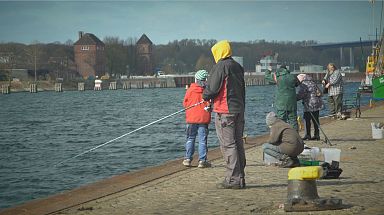Small but mighty, we discover how mussels are helping to clean the Baltic Sea.
The big, beautiful Baltic Sea hides a dirty secret in its 377,000km of water.
A number of agricultural spills has turned the Baltic into one of the most polluted seas in the world, due to excess nitrogen and phosphorus lacing its waters.
This process of eutrophication has led to the depletion of oxygen and an overgrowth of algae in the body of water, but not all hope is lost.
An unlikely assistant
Mussel farms like Kieler Meeresfarm in the German port city of Kiel are hoping to make a difference in the Baltic's increasingly difficult fight against algae.
Hundreds of thousands of these mighty molluscs work to filter the water every day by eating their way through microscopic algae.
Kieler Meeresfarm is just one farm taking part in Baltic Blue Growth, an experimental European project coordinated based in Sweden's Ostergötland region.
The project is worth 4.6 million Euros, with 3.6 million Euros coming from regional aid under the EU Cohesion Policy. 18 partners in six Baltic countries are taking part.
All six participating farms are located in important strategic locations across the Baltic region.
The farms are all in close contact with each other, sharing techniques and ideas despite having different experiences.
Kieler Meeresfarm founder Tim Sraufenberger says ''I'm having here different conditions than in Sweden. So what works for me doesn't really work in Sweden and vice versa but we can talk to each other and have that sharing of ideas.''
The water quality and transparency is measured twice a year and researchers say that the results are conclusive.
More than just mussels
NGO Coastal Union Germany, EUCC, is also helping to raise social awareness on improving water quality.
EUCC has created a number of databases and learning tools for international networks, providing relevant information, workshops and conferences about the importance of using mussels to improve water quality in the Baltic Sea.
Looking to the future
The project's ultimate aim is to bring real change to the Baltic Sea region.
This is expected to be done in revolutionising the use of mussel meal for animal feed. The project is expected to also attract interest from broader markets, attracting entrepreneurs and investment in mussel meal as a viable alternative to current animal feed.












